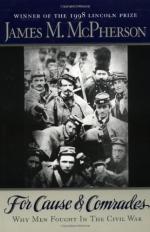
|
| Name: _________________________ | Period: ___________________ |
This quiz consists of 5 multiple choice and 5 short answer questions through Chapter 9, Slavery Must be Cleaned Out.
Multiple Choice Questions
1. During the discussion of primary group cohesion, a soldier in the 122nd New York wrote to his sister in response to how he kept going through all BUT WHICH of these battles?
(a) Petersburg.
(b) Pleasant Hill.
(c) Spotsylvania.
(d) Cold Harbor.
2. An experience at Gaines Mill on June 27, 1862, where the Union line slowly began to leak stragglers, was described by a corporal from which state?
(a) Georgia.
(b) Illinois.
(c) North Carolina.
(d) Pennsylvania.
3. During "Chapter 6: A Band of Brothers," McPherson notes that studies of combat motivation have shown the need of soldiers to prove themselves to wane after how many battles?
(a) 4.
(b) 8.
(c) 2.
(d) 6.
4. In the discussion of hyped-up battle behavior, McPherson notes that the phenomenon has been described as all BUT WHICH of the following?
(a) Fighting madness.
(b) Battle rage.
(c) Combat frenzy.
(d) Military craze.
5. In May 1864 the 7th New York was delighted to be ordered into action; they were less excited nine months later after having lost how many men?
(a) 147.
(b) 291.
(c) 98.
(d) 309.
Short Answer Questions
1. Toward the end of "Chapter 6: A Band of Brothers," McPherson quotes which of the following theorists in relation to ideal primary groups?
2. After the battle of Seven Pines, a captain from which state wrote that he was fine as long as there was battle but that afterward he was quite sick for a few days?
3. In 1864, an officer in which regiment wrote of a successful attack on Confederate lines, defending the Weldon Railroad near Petersburg?
4. As McPherson describes how soldiers on both sides were spoiling for a fight, he mentions an expression denoting exciting experiences: see the _________?
5. From which state was the lieutenant who wrote in March 1862 that he would never "be instrumental in returning a slave to his master in any way shape or manner, I'll die first"?
|
This section contains 311 words (approx. 2 pages at 300 words per page) |

|




